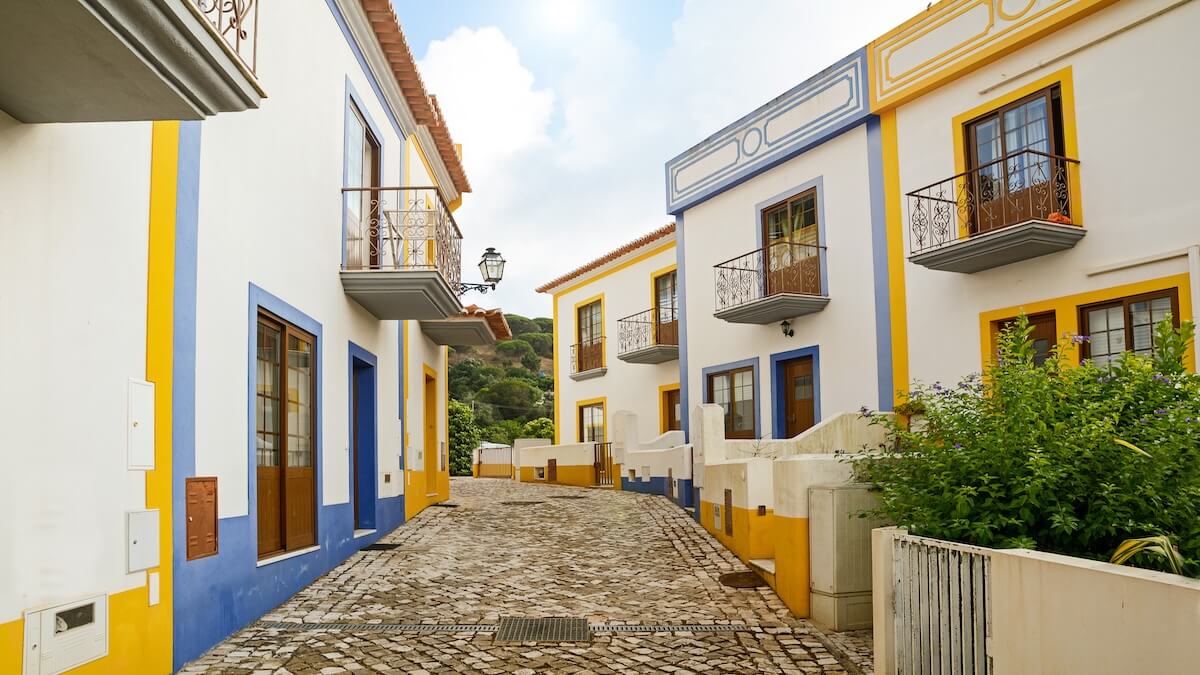Portugal D7 Visa requirements: US guide
Take a look at the full in-depth guide for Portugal D7 Visa requirements and prepare for the next exciting international chapter of your life.

Thinking about buying property in Portugal? You'll want to understand the tax landscape before you sign on the dotted line. Anyone purchasing Portuguese property, including US citizens, faces a series of taxes tied to both the purchase and ongoing ownership.
You'll have to pay one-time taxes when you buy your house or apartment, annual property taxes while you own it, and potentially a wealth tax if you're investing in luxury real estate. Here's everything you need to know about property taxes in Portugal.
We'll also introduce Wise — your international money transfer alternative. Use Wise to send stress-free transfers to over 140 countries - all at the standard mid-market exchange rate.
Even if you're not a Portuguese resident, buying a house or an apartment there means you'll have to pay taxes.
The main annual tax you'll face is the immovable property tax (IMI), which ranges from 0.3% to 0.45% of your property's total value for urban properties. Rural properties get hit with a higher rate of 0.8%.¹
This tax funds Portuguese municipalities and maintains public infrastructure.
You might also face the wealth tax if your property is over 600,000 EUR in value. Companies pay 0.4% on their total Portuguese property holdings, and individuals 0.7%. If you own a property worth more than 1 million EUR, then your wealth tax rate will jump to 1%.¹
These are the main annual taxes you'll have to pay in Portugal, but there are also a few other taxes that come up at different stages of ownership. Here's an overview of what to expect:
| Property tax type | Rate¹ | Frequency |
|---|---|---|
| Immovable property tax (IMI) | Urban: 0.3% to 0.45% Rural: 0.8% | Annual |
| Wealth tax (AIMI) | Individuals: 0.7% Companies: 0.4% Properties over 1M EUR: 1% | Annual |
| Rental income tax² | Residents: 14% to 48% (progressive) Non-residents: 25% | Annual |
| Property purchase tax (IMT) | 0% to 8% | One-time |
| Stamp duty (IS) | 0.4% to 0.8% | One-time |
| Capital gains tax | Residents: 14.5% to 48% Non-residents: 28% | One-time |
We'll explain all of these different property taxes in Portugal in this guide.
Portugal's tax structure is largely uniform, but there are a couple of regional variations that can affect how much you pay in property taxes.
For example, the autonomous regions of Madeira and the Azores offer big tax breaks, with a 30% automatic reduction on IMI rates and more favorable IMT purchase tax brackets.³
At the same time, Lisbon's high property values often push buyers into the top IMT brackets. Properties in an expensive area like that are also more likely to hit the 600,000 EUR wealth tax threshold, while a comparable property in a less popular region may not reach these levels.
IMI is your annual property tax, and it's similar to the property tax you'd encounter in the US. You pay this every year as long as you own the property, and the money goes to local municipalities to fund public infrastructure and services.
The tax is calculated as a percentage of your property's official taxable value. Urban properties are taxed between 0.3% and 0.45%, but rural properties face a higher rate of 0.8%.¹ Each municipality sets its own rate within these ranges, so your rate depends on where your property is located.
IMT is a one-time tax you pay when you buy your property in Portugal.
You'll have to pay this property transfer tax before completing your purchase, and the rate depends on your property's value and whether it's your primary or secondary residence. That said, it'll fall between 0% and 8% of your property's value.¹
Stamp duty is a tax you pay on documents and contracts related to your property purchase. The rate varies between 0.4% and 0.8% depending on the type of transaction.¹
When buying a house, you pay 0.8% stamp duty on the property deed to the notary during the signing process. If you're taking out a mortgage in Portugal, you'll also pay stamp duty on your loan. The rate is 0.6% if your repayment period is more than 5 years, or 0.5% for loans with shorter terms.¹
Portugal's wealth tax kicks in if you own property worth more than 600,000 EUR.¹
Individual property owners pay 0.7% on properties valued between 600,000 EUR and 1 million EUR. If your property is over 1 million EUR, the rate jumps to 1%. Companies face slightly lower rates at 0.4% on their total Portuguese property holdings.¹
You get a 600,000 EUR deduction per person, so if you and your spouse jointly own a property, the wealth tax only applies if it's worth more than 1.2 million EUR.¹
If you ever decide to sell your Portuguese property, you'll pay capital gains tax on any profit you make. Non-residents pay a flat 28% rate on their entire capital gain. If you're a resident, you'll pay a rate ranging between 14.5% and 48% depending on your total income.¹
If your property generates rental income, it'll also be a part of your Portugal expat taxes. Non-residents typically pay a flat 25% tax rate, and residents are subject to a progressive income tax rate between 14% and 48%.²
This can be a complicated topic, so it's best to consult with a lawyer on how much you'll pay in taxes on your rental income, depending on whether or not you're a tax resident in Portugal.
It largely depends on the type of property tax.
For IMI, you multiply your property's taxable value by the municipal rate. For example, maybe you own an apartment in Lisbon with a taxable value of 200,000 EUR. If your municipality sets the IMI rate at 0.35%, you'd pay 700 EUR every year.
For the wealth tax, if your property exceeds 600,000 EUR in value, you pay 0.7% on the amount above that threshold. For example, on an 800,000 EUR property, you'd pay the wealth tax on 200,000 EUR. At 0.7%, you'd owe 1,400 EUR annually in addition to the regular property tax.
Your tax residency status affects certain property taxes in Portugal, such as the capital gains tax, and you don't need to be a Portuguese citizen to become a tax resident. By law, you become a resident for tax purposes if you spend more than 183 days in Portugal during any 12 months.¹
For the annual property taxes, the Portuguese tax authority automatically sends you a payment notice by April 30 each year, either by mail or through their electronic notification system.⁴
Your payment schedule depends on how much tax you owe:⁴
You can also always choose to pay the full amount upfront in May if you prefer.
To pay your IMI tax, you need the payment details from the letter sent by the tax authority. If you lose it, you can find all payment information on Portugal's Finance Portal (Portal das Finanças).
To access it, you'll need one of the following:
- Your NIF (tax identification number) and Finance Portal password
- Digital Mobile Key
- Portuguese Citizen's Card
Online, you can pay through the Finance Portal using your bank's homebanking system, ATM machines, the MB WAY app, or set up direct debit for automatic payments.
If you prefer paying in person, visit any tax office (Finanças) or CTT post office location. You can pay with cash, card, or a dated crossed check.
There are a couple of property tax exemptions in Portugal that can help with your IMI payments.
You can get a 3-year IMI exemption if you buy property to use as your permanent home or rent it out. To qualify, your property must be an urban property with a tax registration value up to 125,000 EUR, and you must have earned no more than 153,300 EUR in taxable income the year before the purchase.¹
There's also a permanent IMI exemption for lower-income households. To qualify, your household's annual taxable income can't be more than 15,295 EUR, and the property must be your permanent residence with a tax value under a specific threshold.¹
It's important to comply with property tax rules in Portugal. If you miss IMI payment deadlines, you'll face interest charges on late payments. Tax authorities can also impose fines or even take more serious action in severe cases. Overall, the best thing you can do is pay your property taxes on time.
Yes, you'll have to pay the annual municipal property tax in Portugal if you own a house, an apartment, or another type of property there. The main annual tax is IMI (immovable property tax), which ranges from 0.3% to 0.45% for urban properties and 0.8% for rural properties.¹
If your property is worth more than 600,000 EUR, you'll also pay the annual wealth tax at rates of 0.7% for individuals or 1% for properties over 1 million EUR.¹
You become a Portuguese tax resident when you spend more than 183 days in Portugal during any 12 months. You'll have to apply to the local tax authority and give them a Portuguese address.¹
Your tax residency affects some property-related taxes, but not all of them. Whether you're a resident or non-resident, you'll pay the same rates for annual property taxes like IMI and the wealth tax. But tax residency does make a difference with rental income and capital gains.
Yes, US citizens pay Portuguese taxes if they own property there, regardless of their residency status. Portugal taxes all property owners on their Portuguese real estate, whether you're a resident, non-resident, or tourist.
However, US citizens must also comply with American tax laws. The US taxes worldwide income, so you'll need to report Portuguese rental income and capital gains on your US tax returns, too. Fortunately, the US-Portugal tax treaty helps prevent double taxation.⁵ You can typically credit Portuguese taxes paid against your US tax liability.
If you want to buy property in Portugal, you'll pay property taxes when buying, while owning, and if you decide to sell at a profit. However, Portuguese property taxes are generally reasonable.
Your annual property tax obligations will range from 0.3% to 0.8% of your property's value, and you won't have to pay the wealth tax unless your property is worth over 600,000 EUR.¹
That said, as a property owner, you'll likely need to move money between Portugal and the US quite often. This can cost you in fees and currency exchange rate markups, so it's important to compare different providers and see which one gives you the best deal.
| Wise can help you get a better deal on currency conversion. You can convert over 40 currencies at the standard mid-market exchange rate, and we'll show you the fees upfront so you know exactly how much you're paying. |
|---|
Get a Wise Account
in minutes 💰
Sources
Sources checked 09/12/2025
*Please see terms of use and product availability for your region or visit Wise fees and pricing for the most up to date pricing and fee information.
This publication is provided for general information purposes and does not constitute legal, tax or other professional advice from Wise Payments Limited or its subsidiaries and its affiliates, and it is not intended as a substitute for obtaining advice from a financial advisor or any other professional.
We make no representations, warranties or guarantees, whether expressed or implied, that the content in the publication is accurate, complete or up to date.

Take a look at the full in-depth guide for Portugal D7 Visa requirements and prepare for the next exciting international chapter of your life.

Wondering how to get a Portugal D8 Visa as an American? Take a look at our overview and learn about the steps and documents throughout the process.

If you're a US expat in Portugal, check out this guide to know whether you're subject to Portugal taxes and how to fulfill your US reporting obligations.

Thinking about moving to Portugal? Find out what you need to know about renting in Portugal in this guide.

Find everything you need to know about moving to Portugal in this handy guide.

Everything you need to know about getting a Golden Visa in Portugal.